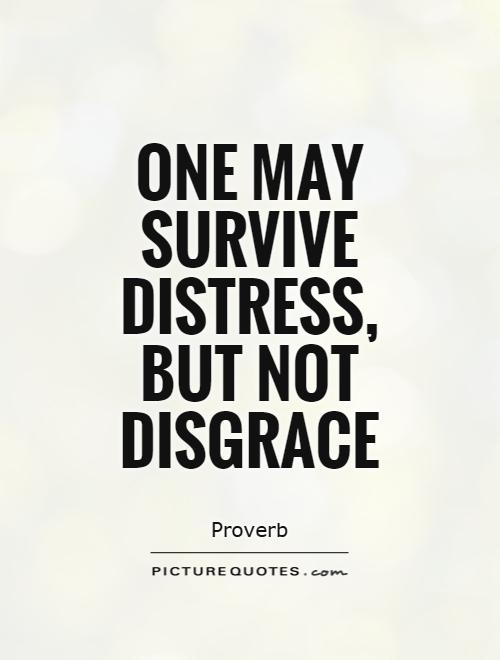One may survive distress, but not disgrace

One may survive distress, but not disgrace
The proverb "One may survive distress, but not disgrace" speaks to the idea that while a person may be able to endure difficult or challenging situations, the lasting impact of shame or dishonor is much more difficult to overcome. This proverb highlights the importance of maintaining one's integrity and reputation, even in the face of adversity.Distress refers to feelings of extreme sorrow, pain, or hardship. It is a temporary state of being that can be overcome with time, support, and resilience. People can experience distress in various forms, such as financial struggles, health issues, or personal loss. While distress can be overwhelming and difficult to navigate, it is often possible to find a way through it with the help of others and by drawing on one's inner strength.
On the other hand, disgrace refers to a loss of respect, honor, or esteem in the eyes of others. It is a stain on one's reputation that can have lasting consequences and can be much more difficult to recover from than distress. Disgrace can result from unethical behavior, dishonesty, betrayal, or other actions that go against societal norms and values. Once a person's reputation is tarnished, it can be challenging to regain the trust and respect of others.
The proverb suggests that while it is possible to survive distress and come out stronger on the other side, the same cannot be said for disgrace. Once a person's reputation is damaged, it can be difficult, if not impossible, to fully repair. This highlights the importance of acting with integrity, honesty, and respect for others in all aspects of life. By doing so, one can avoid the pitfalls of disgrace and maintain a positive reputation that will serve them well in the long run.












 Friendship Quotes
Friendship Quotes Love Quotes
Love Quotes Life Quotes
Life Quotes Funny Quotes
Funny Quotes Motivational Quotes
Motivational Quotes Inspirational Quotes
Inspirational Quotes